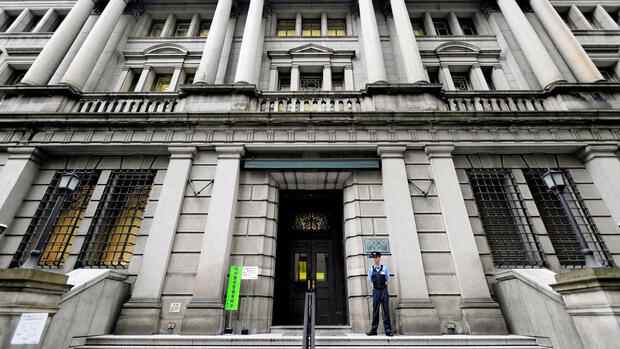Tokyo The Japanese government reacted to the weak yen and intervened directly in the foreign exchange market for the first time since 1998. This was confirmed by Masato Kanda, who is responsible for the foreign exchange market at the Ministry of Finance, on Thursday. The government is concerned about the excessive movements in the foreign exchange markets, he said. That is why they have now taken decisive action.
The last time the government strengthened the yen through direct intervention was during the 1998 Asian financial crisis, when the exchange rate touched about 146 yen. The yen recovered somewhat after the announcement of Kanda.
The Japanese currency has long been burdened by the monetary policy of the Japanese central bank, which remained true to its monetary policy special path through the global wave of inflation on Thursday. While other central banks, above all the Fed on Wednesday, are currently raising interest rates, the Bank of Japan left its low interest rate policy unchanged. The interest rate for short-term government bonds (JGBs) remains at minus 0.1 percent and for ten-year JGBs at a maximum of 0.25 percent.
Top jobs of the day
Find the best jobs now and
be notified by email.
Meanwhile, the US Federal Reserve raised the key interest rate by 0.75 basis points to a range of 3.0 to 3.25 percent on Wednesday in the fight against rapidly rising prices. This is the third such large hike in a row, making it the fastest rate hike cycle in American economic history.
Also read about monetary policy:
Many investors expect that the monetary watchdogs will even raise interest rates to over four percent in 2023 in order to slow down the economy and thus dampen inflationary pressure. Japan’s monetary politicians, on the other hand, continue to step on the gas.
Isolation from global monetary tightening trend
As before the start of the global hike, the Monetary Policy Committee said the bank “will not hesitate to further ease monetary policy if necessary”. In addition, the nine-member panel wrote: “The bank expects short and long-term interest rates to remain at current levels or lower.”
Shigeto Nagai, Japan economist at Oxford Economics, therefore does not believe that the special path will end either, although foreign investors have repeatedly bet against the yen and JGBs this year and are likely to continue their bets. “The Bank of Japan has no choice but to stick with the current policy of yield curve control,” Nagai said.
Even after the end of Governor Haruhiko Kuroda’s term of office in April 2023, he does not expect a turnaround; inflation and the economic recovery are too weak in a global comparison. While prices in the US, driven by high demand, recently rose by 8.3 percent, the figure in Japan was just 2.8 percent in August.
That is higher than the inflation target of two percent. But without the sharp rise in energy and food prices, it was only 1.6 percent. In addition, many economists predict that the inflation rate could fall again in the coming year.
Weak domestic demand
The reason for the slower rise in prices is the continued weakening of domestic demand. While the US economy is already booming again above the pre-crisis level, Japan is still trying to close the gap created by the corona pandemic. Salaries hardly increase either. So far, companies have tried to absorb the increase in costs.
Moody’s Analytics warns that the fall of the yen, which has lost a fifth of its value against the dollar since the beginning of the year, could further push up import costs and thus prices. An increasing number of companies have therefore announced plans for price increases, according to the economists. “This suggests that the strategy of absorbing cost increases is reaching its limits.”
Nonetheless, economists expect the Bank of Japan to remain firm on its soft monetary policy stance. “However, with little sign of demand-driven price pressures, we expect the Bank of Japan to leave key policy levers unchanged.”
Sweeping fall of the national currency
The yen is currently having to pay for this, the exchange rate of which the central bank cannot directly control, in contrast to the interest rates of JGBs. While the rapid fall in the currency is making Japan’s export industry more competitive and profitable, domestically, residents and businesses are being weighed down by rising import costs.
The markets have therefore been speculating for months that the Bank of Japan will have to raise its interest rate corridor after all or that the Ministry of Finance will intervene in the foreign exchange market via the central bank to support the yen. This has now happened.
With material from Bloomberg.
More: “Incredible price hammer” – producer prices in Germany are rising at record speed
